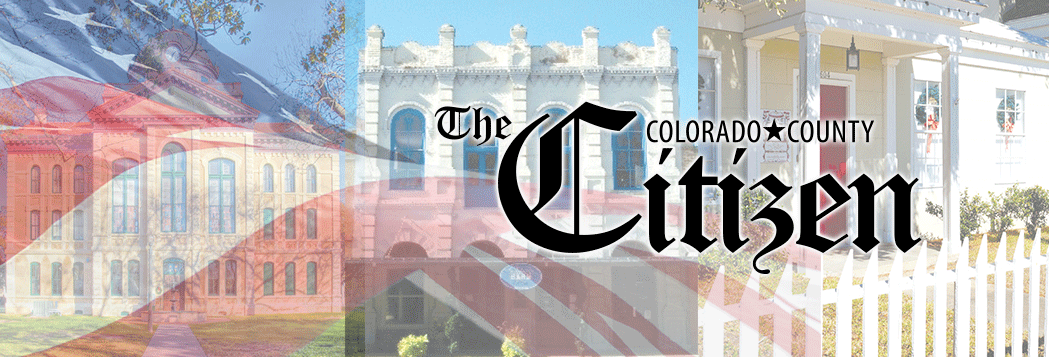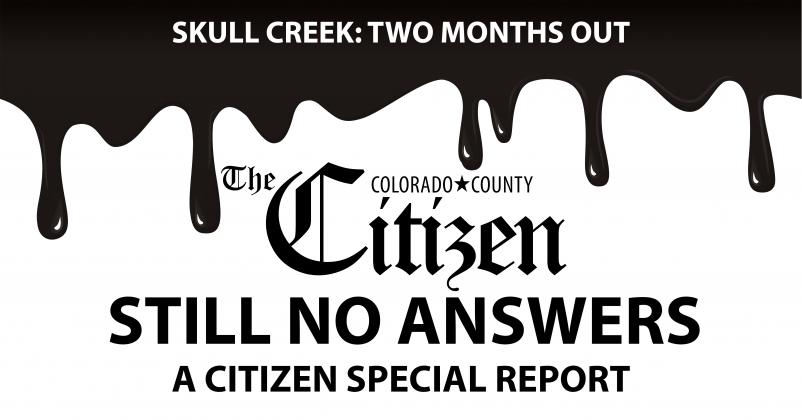Religious leaders say political activism on Skull Creek consistent with teachings
What does your religion say about environmental stewardship? What does your church call you to do when it comes to political activism in regard to environmental calamity?
These are two questions many people of faith in Colorado County have asked themselves over the last two months in the wake of two instances of serious contamination at Skull Creek near Altair, which has been called the worst environmental calamity in the county’s history.
| Read excerpts from ENCYCLICAL LETTER LAUDATO SI’ OF THE HOLY FATHER FRANCIS ON CARE FOR OUR COMMON HOME |
Leaders of the Roman Catholic and Episcopal church say not only is environmental stewardship consistent with their faiths’ doctrine, but that it is deeply rooted in the Christian faith.
When asked what the Roman Catholic Church teaches its parishioners about environmental stewardship, Bishop Brendan Cahill, Bishop of the Diocese of Victoria, which includes Colorado County, said it begins at home with a respect for those who tend to the land and sea.
“In our area I think it begins with respect for the vocation of the farmers and fishermen and their families, who take care of the land/sea and produce food and fiber for our community,” he said.
“There are a lot of environmental concerns on the local and global level – the most basic day to day for us is how it affects the ability of our families to use the gifts God has given us,” he said.
Both Cahill and James Ennis, Executive Director cultivate and develop,” Cahill said.
“In the letter itself is a lot of room for what the church calls prudential judgments,” Ennis said.
“The letter provides scripture background and teaching principals, and it really is up to christians and all people of goodwill how to apply those principles to a specific issue,” he said.
“For Catholic Rural Life, we work with rural communities that experience a lot of environmental degradation from ag practices, for instance. What we teach is to apply those teachings of the church to the specific issues we see,” Ennis said. of Catholic Rural Life, a national Catholic organization based in Minnesota, say Catholics can turn to a 2015 Vatican document for guidance.
The document, Encylical Letter Laudato Sí of the Holy Father Francis on Care for Our Common home, issued in May 2015, details the church’s teachings on matters of environmental stewardship and other similar matters.
“[I]n my view, it really came down to accepting the earth as a gift of God, using our human abilities to cultivate the land/sea for the support and strengthening of families, and handing on what we’ve been given to a future generation to
He said some of their experiences include organizing with multiple communities of faith across regional areas to combat environmental issues and legislative issues, such as the Farm Bill.
He said that while the organization and the church do not impose, they often rather propose organizing.
“Say something needs to stop, and officials identify it as a catastrophe, a lot of church teaching can support local priests and pastors to speak out, and what their congregations should do,” he said.
“A lot of parishoners don’t want to be involved in politics, and see the environment as a left-of-center issue, and that’s where Francis’ letter has really opened the door for conversation,” he said.
“The environment is not a left or right issue, it is a Christian issue of stewardship, of care of our common home,” he said.
Cahill, who serves on the board of Catholic Rural Life should take an acrtive role in political participation, including contacting their elected leaders, when it comes to an environmental calamity in their area.
“Catholics are encouraged to take an active role in politics generally. In my last letter for our Catholic Lighthouse I encouraged the faithful to speak with their representatives about pro-life issues,” he said.
“The same would apply to environmental concerns,” Cahill noted.
“I don’t know if we would need to do anything more to make sure that people complete the job we’ve hired them for,” Cahill said.
Rev. Stephen Spicer, Priest of the Christ Episcopal Church in Eagle Lake, says environmental stewardship is heavily rooted in the bible.
“Starting from Genesis, God says that we have a duty to be responsible with his creation, with his earth, and what he made for us,” Spicer said.
“I think if we are going to serve God in that way, we need to be able to follow that commandment to really respect God’s environment that he created,” Spicer continued.
In terms of political activity related to environmental concerns, he says that while no person has the ability to take a stand on every issue, he would encourage people to take such action.
“I would say that all Christians need to stand up for this particular issue. Everyone only has so much bandwidth, so I wouldn’t say as a Christian, ‘we must stand up for Skull Creek,’ but I think it goes to our personal piety, what we believe God and Christ is calling us to do as the as far as the environment goes, and I would encourage people to do that,” he said.
Spicer said he’s seen churches play a larger role in environmental protection in recent years.
“I’ve seen more of a global church awareness through all denominations and through interfaith—even in Jewish and Muslim communities—that the environment is definitely creeping up on that ladder” he said.
While the Episcopal church has no specific doctrine similar to Pope Francis’ 2015 encylical, he said the church’s Book of Common Prayer actually addresses the environment in one of its eucharistic prayers.

